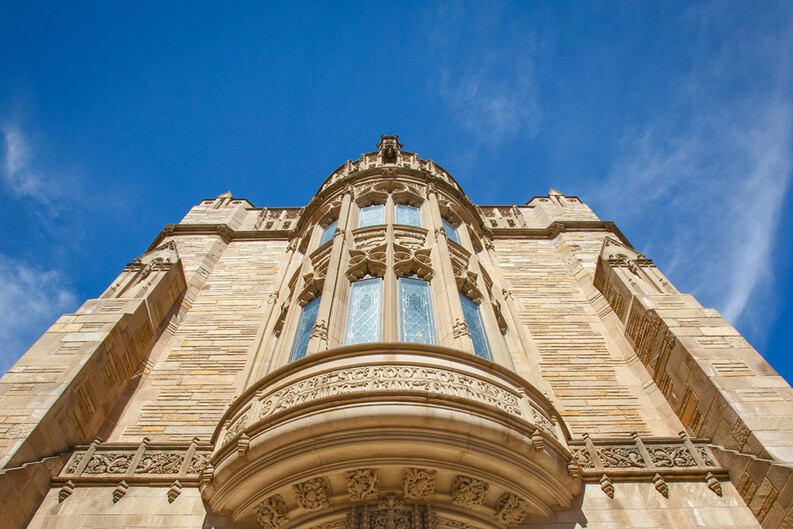Looking Back at a Year of Work with Impact

2021 began with a spring term of hybrid learning due to the ongoing pandemic, but culminated with a fall semester that saw the Yale Law School community once again living, learning, and working together under the same roof. Whether remote or in-person, faculty scholarship and the work of Law School clinics and centers continued to influence national conversations, policy, and impact the lives of those most in need.
Below, look back at some of the top Law School stories of 2021 — a year in which students and faculty secured a historic settlement for veterans, won the release of a client incarcerated for nearly 30 years, represented undocumented children and their families, helped local businesses survive during the pandemic, and spurred the closure of Connecticut’s only supermax prison.
Members of the Law School community worked to effect positive change across disciplines and around the country by advocating for the historic Connecticut Parentage Act, using empirical research and social theory to craft policing reform, and addressing the scourge of gun violence. And in November, the Law School launched The Joseph C. Tsai Leadership Program, a transformative addition that will equip students to effect powerful change no matter what career path or field they pursue.

1. Welcoming an Accomplished and Diverse Group of Students
Aug. 17, 2021—Sterling Law Building and Baker Hall bustled with activity and lively conversation as the 201 students comprising Yale Law School’s newest class — the most diverse in its history — began their legal education together and in person after a year of hybrid learning. In her convocation address, Dean Heather K. Gerken invited incoming students, 54 percent of whom are people of color and just over half of whom are women, to hear and heed one another’s perspectives. “You will be surrounded with some of the most interesting students and faculty in the country,” she noted. “So engage. Debate. Learn. And generate ideas of your own.”
Read more about the Class of 2024
 2. Home is Here
2. Home is Here

July 26, 2021—Law School clinics reflected on their fight on the frontlines of some of the country’s most high-profile immigration cases. The Worker and Immigrant Rights Advocacy Clinic challenged policies including the Muslim ban and the separation of families at the southern border. They also saw their work culminate in the full restoration of the Deferred Action for Childhood Arrivals program. In addition, The San Francisco Affirmative Litigation Project helped secure two critical injunctions — one of them nationwide — that protected immigrants through an innovative partnership with the San Francisco City Attorney’s Office.

3. Announcing The Tsai Leadership Program
Nov. 3, 2021—The Joseph C. Tsai Leadership Program launched in November, built to help students uncover their true purpose, embrace their full potential, and effect powerful change. Two core pillars, the Carol and Gene Ludwig Program in Public Sector Leadership and the Michael S. and Alexa B. Chae Initiative in Private Sector Leadership, provide tailored programming and fellowship opportunities for students who want to pursue nontraditional careers and leadership roles in the public and private sectors.
“The Tsai Leadership Program will help us build on our best traditions even as we reinvent them in order to train every student for their last job, not just their first.” said Dean Heather K. Gerken. “We hope it will support a new generation of changemakers, equipping them to meet the challenges to come while carrying forward the highest ideals of the Law School.”

4. Veterans Clinic Fights for Equal Treatment of Servicemembers
April 29, 2021—Through the Veterans Legal Services Clinic, students secured a settlement that obliges the U.S. Army to reconsider thousands of less-than-Honorable discharges issued to servicemembers affected by post-traumatic stress disorder, traumatic brain injury, and military sexual trauma. Such discharge status can carry lasting stigma, impair hiring prospects, and preclude federal services like medical treatment that veterans would be otherwise entitled to receive. The current case represents the latest in a series of actions brought by the Veterans Legal Services Clinic against other branches of the military on behalf of veterans who unfairly received less-than-Honorable discharges. In September, students filed a new federal class action lawsuit challenging the U.S. Air Force for similar discharge practices. And in a separate nationwide class action victory, the Navy has agreed to review the discharges of thousands of veterans.

5. Lowenstein Clinic Celebrates Prison Closure a Decade in the Making
March 10, 2021—A decade of partnership between the Law School’s Lowenstein International Human Rights Clinic and activists culminated in the closure of Northern Correctional Institution, Connecticut’s only supermax prison this year. For over a decade, Yale Law students had joined forces with campaigns such as Stop Solitary CT and Disability Rights Connecticut to document and challenge the inhumane practices employed at the prison, including prolonged isolation and in-cell shackling. The clinic’s work revealed how Northern violated the human rights of those incarcerated. Clinic students used a robust range of strategies, including an appeal to the U.N. Special Rapporteur on Torture, who found last year that conditions at Northern “may well amount to torture.”

6. Celebrating a Modern Parentage Law
June 2, 2021—Led by Professor Douglas NeJaime, a group of Law School students helped Connecticut enact one of the nation’s most forward-looking parentage laws, modernizing the state’s legal framework and expanding equal protection for LGBTQ parents. The Connecticut Parentage Act (CPA), which NeJaime primarily drafted, requires the state to recognize all parent-child relationships, regardless of the parents’ sexual orientation, gender, marital status, or biological connection to their child. As the state legislature considered the bill last spring, NeJaime and students spoke with parents whose lives the law would change, made their case to legislators, and partnered with other advocacy organizations. The bill received nearly unanimous bipartisan support, was signed by Gov. Ned Lamont, and will go into effect on January 1, 2022.

7. The Road to Redemption
Aug. 24, 2021—Students in the Peter Gruber Challenging Mass Incarceration Clinic, led by Professor Miriam Gohara, helped secure the release of Clyde Meikle from prison after nearly three decades of incarceration. In light of Meikle’s exceptional rehabilitation, Gohara and students spent hundreds of hours meeting with Meikle and preparing his petition for release. The historic sentence modification came to fruition on Jan. 15, 2021. Meikle was released from prison on his 50th birthday and the next day, he graduated from Wesleyan University — an occasion he celebrated with Gohara and the students who assisted his case.

8. Confronting Gun Violence from All Sides
Jan. 25, 2021—Students and faculty from the Solomon Center for Health Law & Policy and The Justice Collaboratory spearheaded a special issue of The Journal of Law, Medicine & Ethics, bringing collaborators from Yale University and beyond together to address the gun-violence epidemic in the United States. The issue’s 26 articles consider gun violence through four interdisciplinary lenses: criminal justice, medicine and public health, regulation and litigation, and data and empirics. The issue served as the capstone for a Law School class, “The Law, Policy, and Guns,” that the issue’s guest editors — Professors Abbe R. Gluck ’00, Tracey L. Meares, and Ian Ayres ’86 — co-taught.

9. Students Mobilize to Provide Pandemic Assistance
Oct. 27, 2021—When the federal eviction moratorium lapsed in August, students in the Law School’s Housing Clinic sprang into action, launching a major effort to help New Haven area businesses and renters. Recognizing that the COVID-19 pandemic has compounded nationwide housing inequities, the students counseled the state legislature on drafting its own eviction moratorium. The Small Business and Community in a Time of Crisis Clinic, founded last year by Professor Anika Singh Lemar, helped local businesses decipher the CARES Act, which provides emergency relief funds, posted flyers promoting their services, and maintained a hotline to assist local business owners.

10. Policing Clinic Puts Theory into Practice
Oct. 5, 2021—Professor Tracey Meares and Clinical Lecturer Jorge X. Camacho ’10 empowered students to combine social theory with empirical research and to devise real policy change in the new Policing, Law, and Policy Clinic. The clinic aims to put meaningful police reform, informed by academic research, into practice. The clinic has brought students into conversation with federal and state policymakers, including officials in Virginia, whom the students briefed about new public safety models, and in Kansas, whose system of community supervision the students assessed and critiqued. The clinic works closely with the Law School’s Justice Collaboratory, as well as the Council of State Governments Justice Center, a nonprofit led by Megan Quattlebaum ’10.


